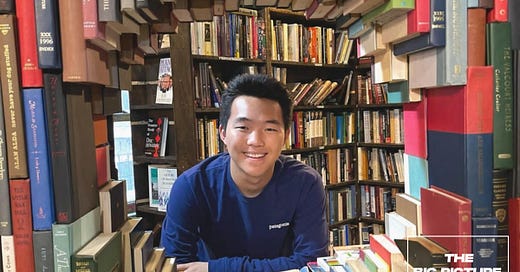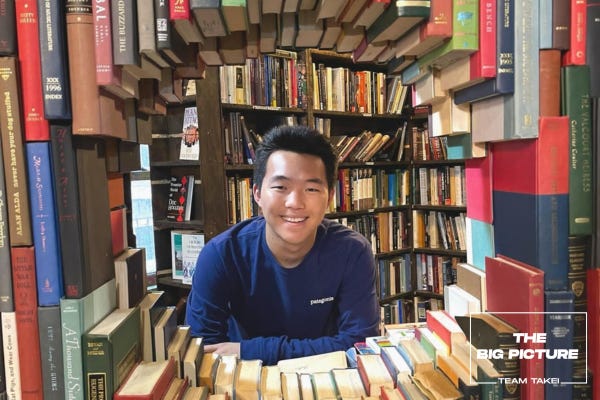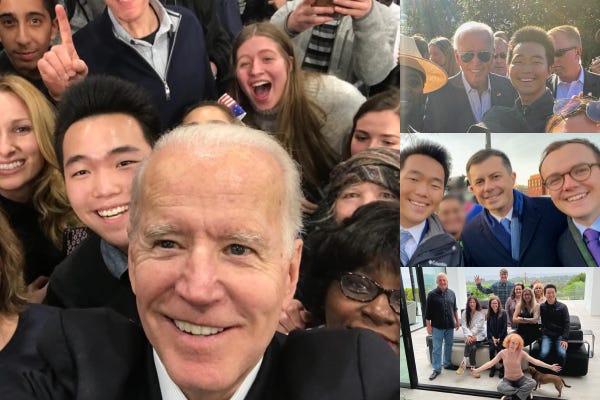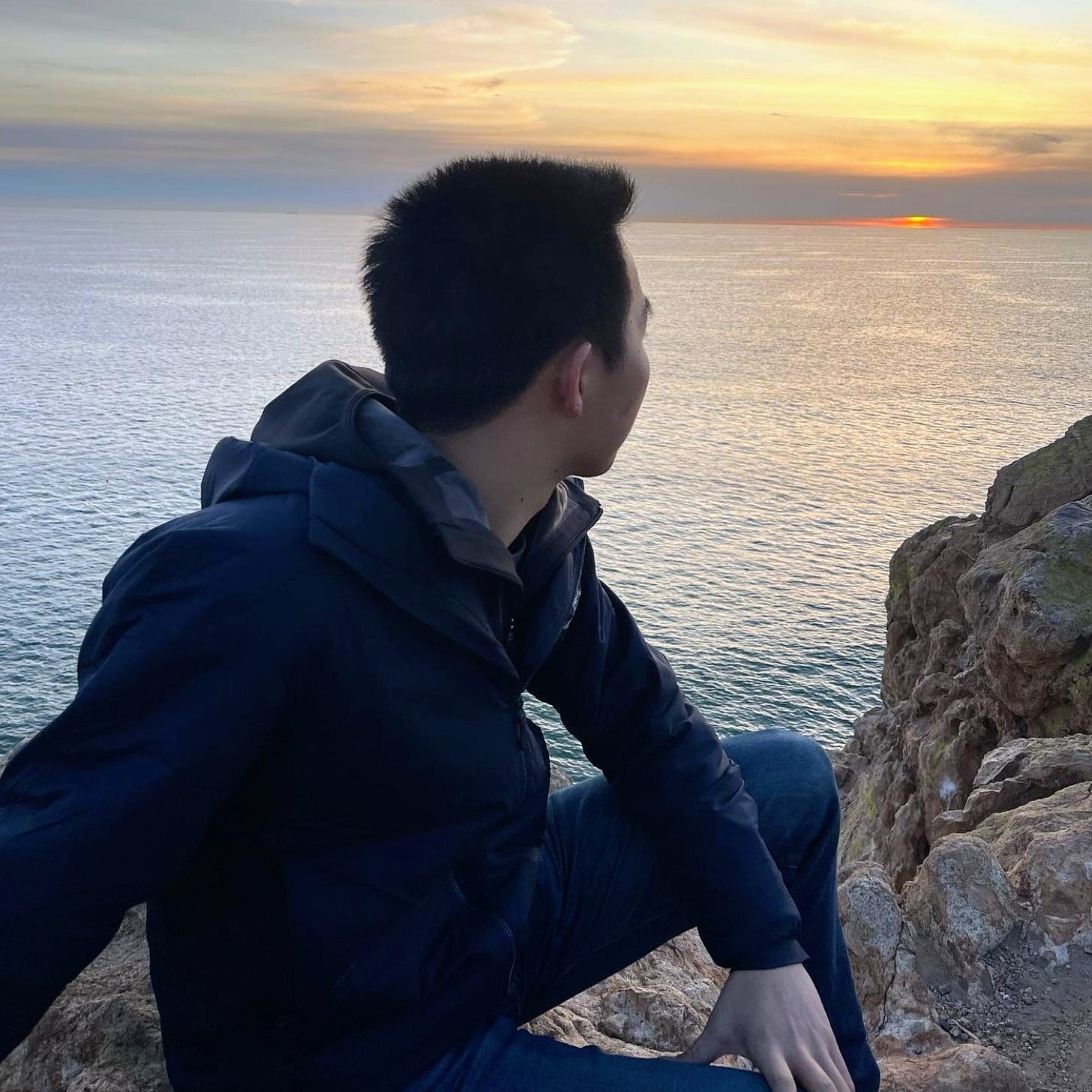The Big Q&A With Gen Z Leader Victor Shi
Gen Z activist, writer, speaker, organizer, podcaster and UCLA student Victor Shi answers questions from George Takei.
I love to hear from young voices, especially those working so hard to preserve our democracy for the future. They give me immense hope and reassure me that all the hard work of our own lifetimes will not have been in vain.
In fact, they will have led to an even brighter future for generations to come.
Our guest today is Victor Shi—writer, speaker, organizer, activist, podcaster and a student at UCLA, where he is majoring in American Literature and Culture.
Victor's time in politics includes working on national, state and local campaigns.
His activism and expertise has him working alongside some familiar faces.
He began his political career as an eighth grader in 2016 interning on Congressman Brad Schneider's campaign and remained on the campaign until 2019.
In 2018, Victor served on Illinois Governor JB Pritzker’s Emerging Youth Leaders Transition Team.
In 2020, Victor was elected as the youngest delegate for Joe Biden to the Democratic National Convention, amassing over 40,000 votes in Illinois’ 10th Congressional District.
Victor served as an Organizer on the Joe Biden for President Campaign, a Fellow on the 59th Presidential Inauguration Committee and as a White House intern.
In today's Big Q&A we're focusing on Victor's work motivating and empowering young voters, age 18-29.
— George Takei and Team
In election after election leading up to the 2016 presidential election, common wisdom was that the “youth vote” was something parties chased at their peril. Young voters never seemed to turn up in enough numbers to really make a difference.
As an important voice today for young voters, what changed?
Is the youth vote now a real force to be reckoned with?
Historically, young voters have trailed older generations in voter turnout—and, generally speaking, there are several reasons why.
First, every campaign wants to make sure that the voters they target are solid and reliable voters. Because of that model, historically, young people have been left out of the equation.
On the surface, there isn't much information or data on youth voter habits and, as a result, campaigns believed reaching out to and engaging with young voters was a risk for campaigns.
Combine that with the numerous systemic challenges that face young people at the ballot box—from a lack of education and resources to far away polling locations on college campuses—it's unsurprising that youth turnout has been historically low.
But, starting in 2018, youth turnout numbers skyrocketed. Prior to 2018, youth turnout hovered around the high teens and low twenties.
But in the 2018 midterm election, youth turnout shot up to 28%. Gen Z is to thank for that. That was the first election in which a significant chunk of the Gen Z population was eligible to vote.
And those Gen Z-ers turned out because they are a part of a generation that fundamentally does not wait around. They are a part of a generation that deeply felt the racism, sexism and dangers of the Trump administration—and, with or without campaigns reaching out to them, they took matters into their own hands and voted.
This trend of engaging in action beyond protesting on the streets extended throughout the next several elections.
In 2020, national youth voter turnout reached nearly 50%. In 2022, the number was slightly below 2018, but, nonetheless, historic compared to elections prior to 2018. And in the most recent Wisconsin Supreme Court election, a record number of young people turned out and voted.
While much of this can be attributed to Gen Z's inherent desire to see change, it's also because candidates and parties have started to pay attention to young voters.
They've seen that we can't just be written off. They've seen that we will turn out and vote in huge numbers. They've seen that they need our vote to win elections.
And that increased awareness and willingness to engage with Gen Z-er's has marked an important shift in electoral politics and spurred a new generation to vote.
Elections analysts saw that younger voters turned out in particularly high numbers in what are called the battleground states—places like Michigan, Wisconsin, and Pennsylvania.
Why do you think that is, and what kind of difference did it make?
Make no mistake: young voters made all the difference in the most recent 2022 midterm elections. If it weren't for young voters turning out—and voting overwhelmingly for Democrats—it's likely that we would've seen not only a red wave in Congress, but those states would have Republican governors and legislatures.
There are two throughlines in all of those states that are worth paying attention to. First, all of those states engaged in a heavy investment in reaching out to Gen Z-ers and making it easier for us to vote.
Whether it was college campuses reminding students how to register to vote or where their nearest polling location is or candidates spending more time on the platforms where young people consume information, each of those states made it a centerpiece to engage with Gen Z-ers.
The second reason why those states saw huge voter turnout was because they didn't shy away from the issues that young people care about. Take Michigan: they had an abortion measure on the ballot and candidates made abortion a central part of their campaign.
Fortunately, it worked, because young people saw, for the first time earlier in 2022, that their rights are fragile. They wanted to see candidates who were willing and vocal to defend their rights and bodies.
As we head into 2024, it's important for every state and candidate to do as much as they can to not only give Gen Z-ers the information and ability to vote, but also to talk about issues that aren't the traditional "kitchen table issues."
Talk about abortion. Talk about gun violence. Talk about climate change. These issues matter and they show young people that we matter.
And that sense of empowerment and visibility is the first step to encouraging a generation to get involved and vote.
How did you personally get started as an activist, and how would you compare where you were a few years ago to where you are at today?
Are you feeling more hopeful for our country, or do you fear we are backsliding?
I started my political journey in eighth grade in a social studies classroom. At the time, I didn't have any idea of what I wanted to do with my life.
In fact, I remember spending my days playing video games and just having fun—what eighth graders do, I suppose. I knew I wanted to do more with my life than that, but I didn't know what.
That is, until my eighth grade social studies teacher sat all of us down a few weeks before the 2016 Iowa caucuses and taught us the political spectrum. She walked us through what Donald Trump, Bernie Sanders, and Hillary Clinton were running on and how to make sense of both political parties.
At the end of her lecture, she told all of us that each of us can make a difference as a young person.
Something lit up in my head after hearing her words and I walked into a campaign office a couple weeks later wanting to do anything and everything.
I knocked on doors. I called voters. I marched in parades with the campaign.
And I loved every minute of it—the ability to talk to voters about issues and help them make a decision, the feeling that I was a part of something bigger to myself, the hope that I could actually create change.
After that, I have continued to work on campaigns, and now, more than 6 years later, my goal is to raise awareness about why young voters are so important and must be paid attention to.
While I am concerned that our country is backsliding in many ways—from the rolling back of rights in Republican states to the attempts to destroy democracy—I am also more hopeful than I have ever been before.
And a large part of that is because I've been able to meet so many extraordinary young organizers, candidates, and even elected officials who are saying enough with the status quo and are demanding a better future for young people.
Knowing that I'm not alone and that there are thousands of other young, engaged organizers and activists out there tells me that we are in very good hands and that the young people will save us.
What are the issues in your experience that really fire up young voters to register and turn out in elections?
Are the parties doing enough to address these issues, and what more could they be doing?
Part of what makes Generation Z unique is that there is no single issue that defines our generation. This is a generation that has a multitude of issues facing our lives—whether it's the high cost of education, the constant fear of being the next victim of gun violence, or simply being able to pay rent on time.
But if you look at polling and what Gen Z-ers say are their most important issues, it's abortion, climate change and gun violence.
We saw the power of abortion being on the ballot in 2022 and it continues to fire up young people. Climate change and gun violence are also issues that affect nearly every Gen Z-er in America and are issues we desperately want to see addressed—and quickly.
Here's the unique circumstance, though. There is only one party that has demonstrated that they are willing to even address these issues: the Democratic Party.
The Republican Party has shown consistently that not only does it refuse to address the issues young people care about, but they are actively seeking to roll back our rights.
The Democratic Party and President Biden, on the other hand, have proven they will deliver for young people. We see that through legislation like the inflation reduction act, which invested a historic amount in climate change, and President Biden's student loan relief program.
At the end of the day, there is such a contrast between both parties and young people see it clearer than ever before.
If you have one message to send to older voters today about your generation, Gen Z, what would that be?
How can older Americans support you and help bring about the future you envision?
One mistake many older generations make is to reduce us to a generation that only cares about one issue or topic.
In reality, what separates Gen Z from any other generation—and why candidates and parties must spend quality time listening to our perspectives—is that there is no one issue that is most important to us.
Although gun violence, climate change, and reproductive rights are top of mind for many young people, Gen Z is a generation that feels as if every aspect of our lives is under attack.
For anyone who wants to truly understand and reach Gen Z, they shouldn’t try to reduce us to single-issue voters. Instead, talk to us. Spend time listening and truly trying to understand matters to us.
We are a generation that is living in a world in which all the cards seem stacked against us, and nothing is certain. The best thing that anyone older can do for Gen Z is to hear us, understand us, and make a commitment to help us in the process.
Also, supporting Gen Z activists and organizations, which I will include below.
How can young voters get more involved?
Can you point us to resources or organizations?
One of the biggest problems with how we talk about politics to young people is that we frame it in national terms. We talk so much about the presidency and Congress, that we lose sight of everything else.
Although the federal level is very important, every young person should understand and think deeply about what's happening in their community and zip code. Find a problem that they see happening right in front of them—not in D.C.—and get involved on the local level.
And truly, no action is too small. Whether it's going to a town hall meeting or writing a letter to an elected official, anything makes a difference.
There are so many great organizations out there mobilizing Gen Z-ers to get involved and equipping them with the tools needed to be active participants in democracy.
Some of them include Voters of Tomorrow, Gen Z for Change, Run for Something and NextGen.
There are also great voter registration websites like "vote.gov"—it's simple and quick and is so important.
Victor is the co-host of the iGen Politics podcast—with Jill Wine-Banks—which engages with all generations in politics. He also hosts the daily Politicon show On the Move with Victor Shi which focuses on Gen Z and the politics and culture unique to them.
Through his podcast and show, Victor has interviewed some of the biggest names in politics, news and culture.
Victor also serves as Strategy Director for Voters of Tomorrow—a Gen Z-led organization that civically empowers and mobilizes Gen Z. He is also a weekly columnist for Resolute Square, where he writes on a wide range of political topics with a youth perspective.
* * *
Remember to take advantage of our special 20% off Indictment Offer!
We depend on voluntary support to keep our Substack thriving. If you’ve been meaning to upgrade your account, why not do it now to take advantage of this special offer?
You’ll have our deepest thanks and appreciation and you’ll also receive our popular Week in Wins every Sunday as our thanks.







I follow Victor on Twitter and believe what he says is obvious - we need the involvement of younger generations. I’m 71 with a Gen Z daughter and I’ve seen as she’s grown up that this generation cares about the planet and each other. They went to school with LGBTQIA+ and trans individuals, they dealt with mental health issues and disabilities and didn’t let any of it stop them. They are also, understandably, impatient and don’t want to wait to outvote the Republicans. We must support them in very way we can.
I’m so impressed and look forward to seeing more of Victor. His future looks bright, and we need more Gen Zers like him !